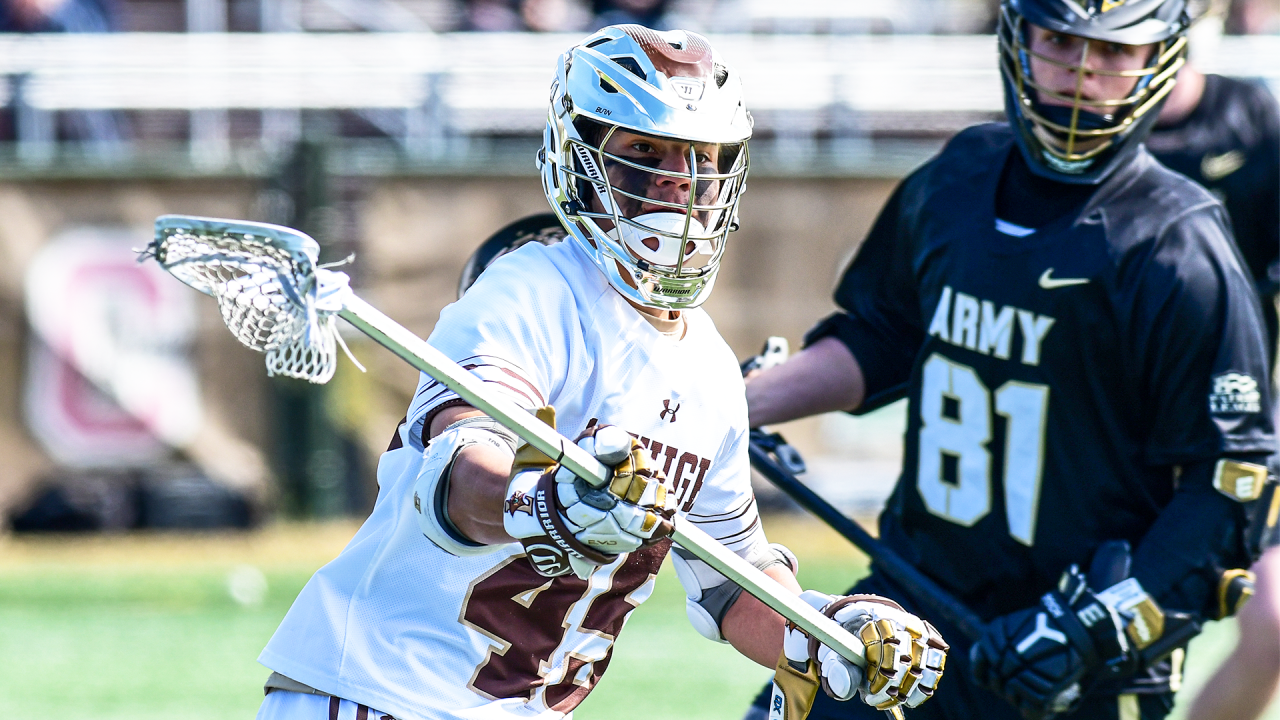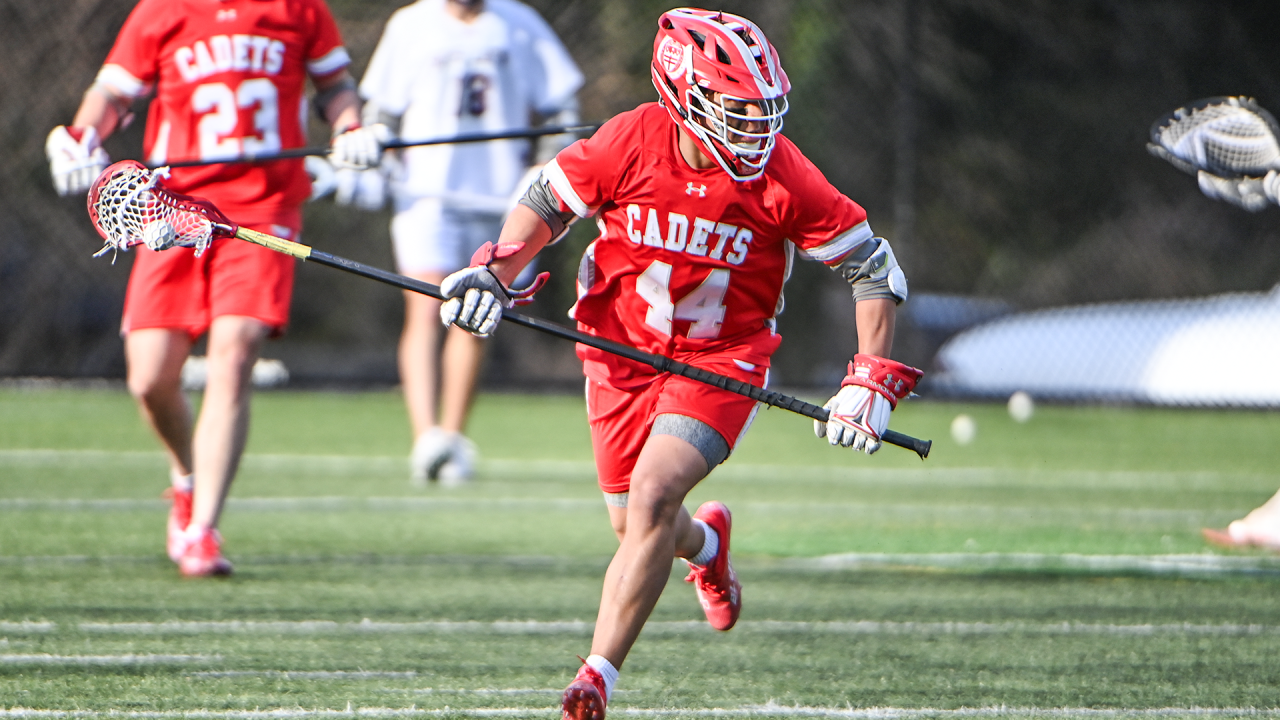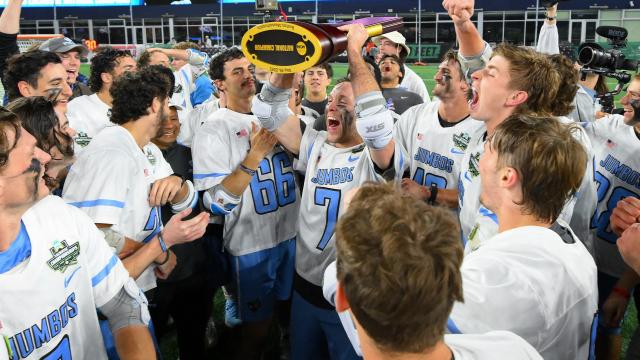
Why Ball Hawk Richard Checo Was Meant to be a Mountain Hawk
At its core, the question is somehow both simple and confounding. And it has to be on the mind of just about anyone who watches or prepares to face Lehigh’s defense.
What makes a 5-foot-9, 170-something-pounder a caused-turnover maestro?
It’s a query best asked directly of Lehigh sophomore Richard Checo and Mountain Hawks coach Will Scudder, who was instrumental in bringing the takeaway artist to Bethlehem, Pa. And it can be explained as more of an exercise in logic than anything else.
If Checo — who tied an NCAA record with eight caused turnovers in a May 3 defeat of Navy in the Patriot League semifinals, then helped a stout Lehigh defense win the conference final two days later — isn’t physically imposing, then he must be doing other things well.
Really well.
When offered up two similar but not entirely interchangeable words — speed and quickness — Checo shrewdly chose another.
Timing.
And it’s not automatic. It’s a function of hours of film study and an understanding of the basic mechanics of how offensive players operate.
“As soon as someone catches the ball and I’m in his hands, he’s not prepared,” Checo said. “He’s not looking at me, he’s looking at the ball because if you’re not looking at the ball, you’re not catching it. I always try to perfect my timing on my approaches, my stick checks, everything.”
Which leads into the other obvious asset.
“His IQ is his greatest strength on the field,” Scudder said. “He’s smarter than he lets on and I think he likes to lead people on to think he doesn’t always know what’s going on. He does. He’s one of the highest IQs on our team.”
Checo and the Mountain Hawks (10-6) will have their largest spotlight of the season to date Sunday afternoon when they visit third-seeded Johns Hopkins in an NCAA tournament first-round game. It is Lehigh’s fourth trip to the postseason, its first since 2021 and first since Checo arrived as an impact freshman who led the country in caused turnovers with 54.
His is a story of unorthodox player development, an unshakable bond with a coach, of personal growth since arriving in college.
And also a subtle, insightful way of viewing what’s going on around him. Richard Checo, it turns out, is a man who trusts his eyes on plenty of matters.
“I always had a knack for wanting to be near the ball,” Checo said. “What’s the best way to play defense? To play no defense at all. That’s what coaches always told me as a kid, so I would always try to take the ball. Now for me personally, it’s all about the preparation. Just trying to know where the ball is going to be before it gets there, knowing tendencies.”

BORN IN MIAMI, Checo moved to Long Island when he was 5. He was off to northern Virginia by age 10, but the time in New York proved formative.
On this front, it’s about the most typical lacrosse story imaginable. He played baseball when he was young, and when some friends asked him to give lacrosse a try, he was happy to oblige. He played offense because most kids try to play offense, developing stick skills along the way. But he was never big, and by the time he was in sixth or seventh grade, he wasn’t getting much playing time for his club team.
His coach needed defenders. Wanting to get on the field, Checo volunteered.
Years went by, and Checo honed his abilities in the Washington area, eventually playing at St. John’s College High School. He also drew some attention for his work at the Juniors Open in Gatlinburg, Tenn., during the pandemic summer of 2020.
Two days after the event, he underwent surgery to correct a labrum injury in his hip. With the start of his junior year coming later that year, his recruitment was set to start Sept. 1.
The flip of the calendar sets off a flurry of activity. Scudder, at the time Lehigh’s defensive coordinator, was impressed with what he saw at the Juniors Open and had followed up his club coaches about his absence from games later in the summer.
An injury was not about to deter Scudder.
“I very pointedly made sure Richard was my first text and first call at midnight on Sept. 1 of that year,” Scudder said. “I figured other schools would have forgotten about him or put him down the list because he wasn’t playing. For me, it’s all about the person’s character. You can tell when you meet a family and meet a young man how bad he wants something. And once I got Richard on the phone, I knew right I away I loved this kid and he would be really successful if we were able to get him here.”
This was certainly not what Checo heard elsewhere. Several schools — he wouldn’t name names — said they needed to see him play after he had rehabbed. He replied he respectfully planned to be committed by then.
But other responses irked him even more.
“I just wanted to prove everyone wrong that didn’t believe in me,” Checo said. “I got a lot of calls in the recruiting process from coaches saying, ‘We think you’re a great player and all, but you’re not big enough, you’re not fast enough, you’re not this, you’re not that.’ I was always like, ‘Dang, why’d you call me, then?’ It always rubbed me the wrong way.”
There were no such problems with Lehigh. Checo describes Scudder as “almost as a second dad,” and their relationship led to him committing to the Mountain Hawks toward the end of September 2020.
Months later, fully healed, he delivered a monster junior season.
“Then I started getting calls from other schools, the higher-end schools and I’m like, ‘Now you guys want to call me?’” Checo said. “Nah, I’m OK. I’ve got Coach Scudder.’ And I got called crazy for it.”
The loyalty element mattered, certainly, but Checo also fit into a string of defensive disruptors Lehigh has churned out over the last decade or so.
There’s an uninterrupted through line of Lehigh’s four best takeaway guys, from Tripp Telesco to Craig Chick to Teddy Leggett and now Checo. Of the bunch, only Chick had more caused turnovers than the 99 Checo has amassed.
Chick’s experience was illuminating for Scudder, and it made figuring out how to best utilize Checo easier.
“For Craig’s whole freshman year, he’s throwing over-the-head checks, he’s doing these things and it goes against everything you’re taught defensively,” Scudder said. “I spent a whole year trying to beat it out of him, and then I realized this kid is really good at this — I’m not going to take his greatest strength away from him. Let’s figure out how to make the other guys around him play to it. As soon as we recruited Richard, I was like, ‘Exact same type of player, and that’s going to be the challenge.’”
Put succinctly, the rules of a defensive scheme change when one player is operating by a different set of principles. Most teams probably aren’t going to slide to a pole.
Lehigh will, mainly because the calculated risk -— a term Checo prefers to “high risk/high reward,” again demonstrating some rhetorical nuance — is worth it if it frequently zaps opponents’ possessions.
“His schemes always seem to put me in the right position, and it gives me enough freedom to know I’m going to mess up every once in a while,” Checo said. “It’s going to happen, but he knows I’m going to make a play more than I mess up. That’s just a trust thing we have, and I can’t thank him enough. I know a lot of coaches, if I was in the ACC or the Big Ten right now, I make one small false step not in the same line as everyone else, I’m getting pulled and I’m not playing anymore.”
Now you guys want to call me? Nah, I'm OK. I've got Coach Scudder.
“WHAT.”
Checo is not really a morning person, so when he received an 8 a.m. call just after Scudder was elevated to Lehigh’s head coaching position after longtime coach Kevin Cassese left to become Virginia’s offensive coordinator last June, he wasn’t exactly screening the call.
Mainly, he figured something bad must have happened if he was getting pestered so early on a summer day.
“Yo, where are you right now?” Scudder said, to which Checo replied he was at his girlfriend’s home in Westport, Conn. “OK, I’ll see you in three hours. I need to come talk to you.”
A bewildered Checo repeated his first word in the conversation, and Scudder replied he was leaving Bethlehem at that moment and would be there in a few hours, even if he was driving into the maw of New York-area traffic.
“In that moment, I truly realized, ‘This man will do anything for me,’” Checo said.
The two went and had lunch, and Scudder — whose immediate priority after getting the job was making sure he retained his roster — told Checo the Mountain Hawks would win a championship this year. The rising sophomore had had to trust him.
“All right, I’m not going anywhere,” Checo replied. “You’re here, I’m here. That’s really all it was.”
It’s not warm and fuzzy all the time. Scudder said even in the fourth quarter of his record-tying outing against Navy, he got after Checo for a miscue. Yet given the bond, there’s plenty both would do for each other.
Impressive though Checo’s numbers have been this year, Scudder emphasized other improvement as the most notable part of the defenseman’s season.
“The thing I’ve been most proud of Richard over the last eight months is he’s become a much better teammate in his sophomore year,” Scudder said. “He does get a lot of the limelight, and deservedly so. He was out in the preseason and he’s been out [at times] and battling injuries all year and when he’s on the sideline, he’s filling up water and he’s checking on his teammates. He needs to be humbled at times, and I do that, but that’s been the thing I’ve been most impressed with. He’s grown up, maturity-wise, a lot.”
Plenty has changed since that hip surgery nearly four years ago. The superb high school career. The seamless segue to college, one that became obvious when he stripped the ball from Georgetown’s Tucker Dordevic in a chaotic late March game last season. And now a national stage, and at a venue — Homewood Field — where he saw plenty of games while growing up.
The general skillset — probably not the best footwork in the world, but elite preparation skills, fine stickwork in transition and a superlative ability to pick off passes — is the same. But he is as aligned with everything and everyone around him as he’s ever been.
“Every time you take the field, it’s not your one-on-one matchup,” Checo said. “It’s 46 guys against whatever number the other team has. We’ve really embraced that this year. I think we were expected to finish fifth in the Patriot League this year and we come out and win it all and everyone’s so shocked. Me personally, I wasn’t too shocked.”
Nor should anyone be with whatever is still to come for Checo. Given the last two years, it really is simple, and not the least bit confounding. The takeaway machine is a fit for Lehigh, and he’s not nearly done causing fits for opponents.
Patrick Stevens
Patrick Stevens has covered college sports for 25 years. His work also appears in The Washington Post, Blue Ribbon College Basketball Yearbook and other outlets. He's provided coverage of Division I men's lacrosse to USA Lacrosse Magazine since 2010.

Related Articles





